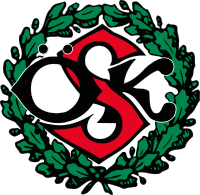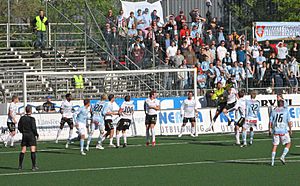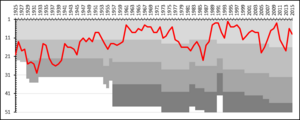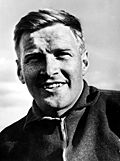Örebro SK facts for kids
 |
|||
| Full name | Örebro Sportklubb | ||
|---|---|---|---|
| Founded | 28 October 1908 | ||
| Ground | Behrn Arena, Örebro | ||
| Capacity | 14,400 | ||
| Chairman | Kent Persson | ||
| Head coach | Christian Järdler | ||
| League | Superettan | ||
| 2024 | Superettan, 11th of 16 | ||
|
|
|||
Örebro Sportklubb, often called Örebro SK or ÖSK, is a Swedish professional football club. It is based in Örebro, Sweden. The club is part of the Örebro Läns Fotbollförbund and plays its home games at Behrn Arena.
ÖSK's team colors are white shirts and black shorts. This is why they are nicknamed Svartvitt, which means "black-whites". The club was started on October 28, 1908. Örebro SK has played 50 seasons in Sweden's top football league, Allsvenskan. Their first season in the league was in 1946–47.
Club History
How ÖSK Started
Örebro SK was founded in 1908. A group of 79 young people left IFK Örebro after some disagreements. Pelle Molin and Karl Graflund were key figures in starting the new club. They first thought about names like Örebro Idrottsförening or Örebro Allmänna Idrottsklubb. But they finally chose Örebro Sportklubb (ÖSK). The team's first colors were all black.
In 1909, ÖSK won its first title, a local bandy tournament. The club played its first football match that same year. In 1911, they started playing league football in the Örebro League. ÖSK won this league for the first time in 1913.
In 1917, they played in the Västmanland-Närkeserien. They also reached the semifinals in the district championship.
In 1920, their first coach, Hjalmar Bergman, joined the team. ÖSK also played in the cup for the national championship. They had their first international match against B 93 Copenhagen.
In 1922, the club changed its colors. They switched from all black to white shirts and black shorts.
Örebro SK celebrated its 15th anniversary in 1923. Their home stadium, Eyravallen, was built that year. It is now known as Behrn Arena.
In 1925, Örebro finished last in Division 2. But they were allowed to stay in the league. In 1926, ÖSK was promoted to Division 1. After a draw in their first game, Örebro lost 0–4 to Westermalms IF. They were then sent back down to Division 2.
In 1928, during their 20th anniversary, ÖSK was relegated to Division 3. They hoped to return quickly, but lost a play-off game. However, ÖSK returned to Division 2 in 1933 after winning Division 3. In 1934, they finished second. But in 1936, they were relegated back to Division 3.
In 1939, Konrad Kalman from Hungary became the new manager. Fritjof "Tjoffe" Olsson became the first ÖSK player to play for the Swedish national team.
The club returned to Division 2 in 1940. They went through Division 3 without losing a game. They also won against IF Rune in a play-off. The next year, they finished second in Division 2.
In 1946, ÖSK was promoted to Allsvenskan for the first time. They beat Surahammar in a play-off. However, they only stayed in the top league for one season. They were relegated in 1947. The club returned to Allsvenskan in 1948, for their 40th anniversary. But again, they only stayed for one year.
They returned to Allsvenskan again after beating Surahammar in a final league game. This time, they stayed longer. They beat IF Elfsborg 2–0 in the last game of the season. In 1952, the club had its best season yet, finishing eighth. But the next year, they were relegated back to Division 2.
In 1958, Orvar Bergmark played for the club. He won a silver medal in the 1958 FIFA World Cup held in Sweden. Karl Graflund, one of the club's founders, retired. He had been chairman for 48 years.
ÖSK in the Top League (1960–1978)
Örebro SK returned to Allsvenskan in 1960. They beat IFK Kristianstad and IFK Luleå in a play-off. That same year, the club sold its stadium, Eyravallen, to the city of Örebro.
The club won the bronze medal in 1961, finishing fourth. A derby game against rivals Degerfors IF had 20,066 fans. This is still the club's record for attendance. In 1962, the club finished sixth. Orvar Bergmark left to join AS Roma.
Örebro SK became a stable mid-table team. They finished eighth in 1963 and 1964, sixth in 1965, and seventh in 1966. In 1967, they won their second bronze medal. In 1968, they finished fifth. In 1969, they were close to being runners-up. But they lost their last game and finished fifth.
In 1970, the club was almost relegated. But they stayed up by beating IFK Göteborg 1–0. This sent the champions down to Division 2 instead. This game is known as the first time football hooliganism happened in Sweden. Angry IFK Göteborg fans ran onto the field and removed the goal posts. From 1971 to 1976, ÖSK stayed in the middle or lower part of Allsvenskan. In 1977, Örebro was close to relegation again. They secured their spot in the top league in the last game. But this only lasted one more year. After 18 seasons in Allsvenskan, Örebro was relegated to Division 2 in 1978.
Tough Times in the Second Division (1979–1987)
From 1979 to 1981, the club finished as runners-up for three years in a row. They lost out to teams like IK Brage and AIK. After losing several players, the 1982 season was disappointing. ÖSK finished fifth in Division 2. Before the 1983 season, the club wanted to return to Allsvenskan. They hired star manager Roy Hodgson. He had won two gold medals with Halmstads BK. New players also joined. However, IFK Norrköping and Djurgårdens IF were stronger. Örebro finished third in a tough second division.
In 1984, ÖSK, still managed by Hodgson, won Division 2 North. But they had to play a play-off against the runner-up of Division 2 South. Mjällby AIF was too strong, and ÖSK lost both games. At the end of the season, Hodgson moved to Malmö FF. He was replaced by Stuart Baxter, who had just stopped playing for ÖSK. After finishing fourth in 1985, the 1986 season was almost a disaster. The club was saved from relegation by rivals Västerås SK. They beat Enköpings SK on the last day. In 1987, another big effort to reach Allsvenskan failed. They signed famous coach Rolf Zetterlund, but the club only finished third.
The Dahlkvist Years: Back in the Top League (1988–1999)
The next attempt in 1988 was successful. Before the season, Zetterlund brought Sven Dahlkvist to ÖSK from AIK. Dahlkvist was a top player in Sweden in 1984. He became a club legend as both a player and coach. As the club celebrated its 80th anniversary, ÖSK finally returned to Allsvenskan. At the same time, Örebro SK Fotboll became a separate club focused only on football. Örebro SK Ungdom was also created for younger players.
Örebro SK's return was good. The club quickly became a top team in Allsvenskan. In their first year, ÖSK qualified for the play-offs (finishing fourth). But they lost the semi-final against IFK Norrköping. In 1990, the club reached the semi-finals again (finishing third). This time, IFK Göteborg was too strong. Their goalkeeper Thomas Ravelli made an amazing save against a header from Sven Dahlkvist.
In 1991, a new league system started. In the new 10-team league, the club finished as runners-up. They were second to IFK Göteborg only because of goal difference. But they dropped to third in the Mästerskapsserien (a mini-league for the top six teams). ÖSK's strong results were thanks to new striker Miroslaw Kubisztal. He was signed from GKS Katowice in Poland. "Miro" or "Kuba" quickly became a fan favorite. Even today, ÖSK fans are called "Kubanerna" in his honor.
Their great performance in the previous season also led to Örebro's first time in the 1991/1992 UEFA cup. ÖSK had bad luck and played against the future champions, Ajax, in the first round. ÖSK held the Dutch team scoreless for 60 minutes in the first game. But they eventually lost 3–0. They then lost 1–0 in the second game at home.
The next year was not as good. The team did not qualify for Mästerskapsserien. Instead, they had to fight against relegation in Kvalsvenskan. After a bad start, Örebro secured their spot in Allsvenskan. They had an amazing 7–1 win against BK Häcken. They finished second and qualified for the new Allsvenskan. From 1993, the league had 14 teams and no play-off for the championship. Örebro also played in the UEFA cup for the second time. They lost a close match against KV Mechelen (2–1 overall) in the first round.
Coach Zetterlund left the club after the 1992 season. Kent Karlsson replaced him. ÖSK looked good in pre-season games. But they played badly when the league started. Karlsson soon left his coaching job for personal reasons. The club brought in Dahlkvist as a replacement. He had retired after the 1991 season to be the club's technical director. He made a temporary return in late 1992. Dahlkvist now had two roles: coach and technical director. However, the 1993 season ended with a disappointing 12th place for Dahlkvist's team. This meant ÖSK had to play a play-off against Vasalund/Essinge IF to stay up. The club stayed in Allsvenskan because of the away goal rule. The first match was 2–2, and the return game at home was 0–0.
Before the 1994 season, Örebro SK only bought one new player. But this player was very important. Former Anderlecht star Arnor Gudjohnsen joined from BK Häcken. He played as an attacking midfielder behind striker Miroslaw Kubisztal and young star Mattias Jonson. Gudjohnsen quickly became the leader of ÖSK's strong attack. 1994 was the best season in the club's history so far. The club scored 62 goals and fought for the championship until the very end. On the last day of the season, ÖSK, IFK Göteborg, and Malmö FF all had a chance to win Allsvenskan. The last two teams played against each other. Örebro SK won easily away against Landskrona Bois. The only way they would lose the title was if IFK Göteborg won. IFK Göteborg scored a late winning goal to secure the championship. In 1994, Örebro also became the first Swedish club to score in all 26 games of the season.
The club did not reach the same level in 1995 as the year before. They were close to winning a medal but failed at the end. The club also had an embarrassing third appearance in the UEFA cup. They were disqualified for using too many foreign players in a preliminary round against Avenir Beggen from Luxembourg. This mistake raised questions about Dahlkvist's double role as coach and technical director.
After the 1995 season, Mattias Jonsson joined Helsingborgs IF. He then became a regular player for the national team. Dan Sahlin replaced Jonsson. He was signed from relegated Hammarby. Daniel Tjernström also joined from local rival Degerfors IF. Despite a bad start to the 1996 season, the club finished fifth. They had some impressive games in the second half. 1997 was a mixed season. The club moved up and down the table. But as often happened, they played strongly in the autumn. This earned them fourth place and the bronze medal. Striker Dan Sahlin also won the golden boot as the league's top scorer. This year, Örebro played in the UEFA cup again. They qualified for the main tournament by beating FK Jablonec from the Czech Republic on away goals. In the main tournament, Rotor Volgograd from Russia was too strong. They won 6–1 overall.
The 1998 season started very poorly. After six matches, the team was last in the table. However, the team improved and for a while held second place. But they ended up sixth after losing their two biggest stars during the summer break: Arnor Gudjohnsen and top scorer Dan Sahlin. The next year, 1999, the club started poorly again. But they grew stronger over the summer. As autumn came, their form faded. The club had to play play-off matches against Assyriska FF. Örebro won and stayed in Allsvenskan only in the second match, during extra time. Goalkeeper Anders Karlsson also became the player with the most appearances for the club, with 373 matches. After the 1999 season, Dahlkvist left his roles as coach and technical director. He had spent 12 mostly successful years with the club. This included the promotion in 1988, the 1994 silver medal, and other medals in 1989, 1990, 1991, and 1997.
A New Start (2000–2006)
As the new millennium began, Örebro SK was expected to challenge for the top of Allsvenskan again. They signed head coach Mats Jingblad from IFK Göteborg and former top scorer Niklas Skoog in 2000. After beating IF Elfsborg in August, the club reached third place. Many believed they were on the right track. However, due to mixed results, the club finished 10th. At the end of the season, talented local player Mats Rubarth left for AIK. The 2001 season was only slightly better, with an eighth-place finish. The club scored the second-highest number of goals in the league (48 goals). But they also let in 44 goals. Many needed victories ended up as draws because they conceded late goals. The club also lost top scorer Skoog to Malmö FF during the summer. The 2002 season ended with a seventh-place finish. After the season, Eyravallen was renovated. The natural grass was replaced with artificial turf, and new stands were built. Another club legend, goalkeeper Anders Karlsson, retired after almost 20 years with the club.
The 2003 season under new coach Stefan Lundin started well for Örebro. But again, a poor end to the season saw the team finish eighth. Promising goalkeeper John Alvbåge and Danish veteran Lars Larsen joined. They quickly became favorites of the Örebro fans. The 2004 season became one of the club's darkest years. First, Örebro had to fight hard to avoid relegation. A great effort with five straight wins at the end of the season earned them a mid-table finish (seventh, later changed to eighth). But this effort was useless in the end. ÖSK had faced major financial problems for some time. Even after a huge effort by supporters and sponsors, the club was relegated. The Elitlicensnämnden (Elite license board) ruled that the club's finances did not meet the standards. Örebro SK's appeal failed, and the club was forced to play in Superettan.
ÖSK managed to keep most of its players for the first season in Superettan. Goalkeeper John Alvbåge left for Viborg. Patrick Walker, who had been with the club before, returned as head coach. Many expected the club to return to the top league quickly. The home crowd had high hopes. They even booed the team despite a 3–0 win against Bodens BK in the first game. That turned out to be their last win for a while. After a terrible spring, ÖSK was fighting against relegation. A better autumn secured a fifth-place finish. But ÖSK was nowhere near promotion. 2006 started with impressive wins. But the club lost its ability to score goals in the middle of the season. Bosnian player Nedim Halilović joined from NK Varteks. This signing was very important. Halilović's goal-scoring in the autumn of 2006 brought the club back to the top. On a tense final day, Örebro beat Assyriska FF 2–1. At the same time, Brommapojkarna lost to Trelleborgs FF. The club was back in Allsvenskan. The win against Assyriska also marked the end of an era. Veteran Thomas Andersson, who had to leave the field due to a bleeding injury, played his last game for the club. After this, Andersson is remembered as Captain Blood by the club's fans.
A Fresh Start (2007–)

2007 was a tough comeback season in Allsvenskan. Nedim Halilović could not score as many goals. The club fought against relegation with fellow promoted teams Trelleborgs FF and Brommapojkarnas IF. (Only one team was relegated as the league grew to 16 teams the next season). After signing local talent Abgar Barsom and firing coach Patrick Walker, Örebro's form improved in the autumn. An important first away win of the season against Elfsborg secured another year in Allsvenskan.
To prepare for the 2008 season, the club's board decided to change the club's approach. Finnish-Swedish coach Sixten Boström was brought in. Local coach Alexander Axen assisted him. Players like Larsen and Barsom left. But two other local talents, Magnus Kihlberg and Samuel Wowoah, returned. Boström also showed trust in talented player Nordin Gerzic. Gerzic became a regular player after spending most of 2007 on the bench. Despite some good games, the team struggled to score. They lacked a natural target player in their new 4–3–3 system. Gerzic, a natural midfielder, often played as a forward in the spring. By the summer break, it looked like the team would fight relegation again. However, in the summer, Danish striker Kim Olsen joined. This meant Gerzic could move back to midfield. Former goalkeeper John Alvbåge also made a popular return. The new players filled important gaps, and Örebro immediately started winning. After earning seven points in three games against top teams, relegation was no longer a threat. Örebro was one of the best teams in the second half of the season. They eventually finished seventh.
The successful end to the 2008 season continued into 2009. Several new talented players joined the team. These included Alejandro Bedoya (who played for the US national team) and Michael Almebäck. Local talent Marcus Astvald also joined. Both Almebäck and Astvald were selected for Sweden's U-21 squad. After an unlucky start with two losses, Örebro soon joined the top teams. Only a period of bad form late in the season stopped them from winning a new medal. Örebro finished sixth.
In 2010, Sixten Boström worked with almost the same team as in 2009. They added Paulinho Guara on loan from Korean Busan. Despite a couple of unexpected home losses early in the season, Örebro was clearly a top team. Clear losses to eventual champions Malmö FF ruined their chance for gold. But impressive home wins against Elfsborg and Helsingborg (both 3–0) showed the team's potential. The team finished third, earning them a "little silver" medal. This also gave them a spot in the second qualification round for the 2011-12 UEFA Europa League.
In the summer of 2010, striker Kim Olsen left the team. Several young players joined. One of them, Astrit Ajdarevic, made an immediate impact. He came on as a substitute and scored a late, beautiful goal against Elfsborg away. He then scored two goals in a home win. However, Ajdarevic was not fit enough to be a regular starter. Örebro wanted to keep him, but he received a better offer from IFK Norrköping. So, he left the team at the end of the season.
The transfer period after the 2010 season was very busy. Despite early rumors of many top players leaving, only Roni Porokara and Paulinho Guara left from the starting lineup. Örebro, with good finances, bought several new players. They signed top player Valdet Rama from Hannover 96. Former Örebro defender Patrik Haginge returned. They also signed striker Andreas Haddad and young talents like Atashkadeh, Lushtako, Ibrahim, Yasin, Berger, and Holmgren.
However, the 2011 season did not meet the high hopes of the fans. Örebro SK often scored the first goal. But they had three long losing streaks. They ended up in a disappointing 12th place in Allsvenskan. They also had an early exit from the Europa League qualification (against Sarajevo). Finally, they lost the semifinal of the national cup (against cup and league champions Helsingborgs IF). The strong ÖSK team became weaker during the season. Defender Andreas Haddad and Patrik Anttonen missed most of the season due to injury. In the summer, two of the team's best players left. Mikael Almebäck went to FC Bruges, and Alejandro Bedoya went to Glasgow Rangers. Both left for small transfer fees because their contracts were ending soon. Shortly before the season ended, goalkeeper John Alvbåge announced he was also leaving for IFK Gothenburg.
In July 2018, Brendan Hines-Ike was transferred to K.V. Kortrijk. The fee was reportedly US$750,000. This was the biggest sale in Örebro SK's history. It was also KV Kortrijk's biggest purchase.
Players
Current Squad
|
|
Players on Loan
|
|
Coaches
 Kálmán Konrád (1939–42)
Kálmán Konrád (1939–42) Harry Magnusson (1942–44)
Harry Magnusson (1942–44)- Erik Östling (1944–45)
- Werner Löwenthal (1945–47)
 Harry Magnusson (1947–48)
Harry Magnusson (1947–48) Gösta Dunker (1948–49)
Gösta Dunker (1948–49) Gösta Dunker and Sten Dahl (1949–50)
Gösta Dunker and Sten Dahl (1949–50) Per Kaufeldt (1950–51)
Per Kaufeldt (1950–51)- Widorf Pettersson (1951–52)
- Widorf Pettersson and
 Bertil Nordahl (1952–53)
Bertil Nordahl (1952–53)  Frank Soo (1953–54)
Frank Soo (1953–54) Gösta Lindh (1954–55)
Gösta Lindh (1954–55)- Widorf Pettersson (1955–56)
 Harry Magnusson (1956–57)
Harry Magnusson (1956–57)- Åke Engvall and
 Billy Burnikell (1957–58)
Billy Burnikell (1957–58)  Orvar Bergmark and
Orvar Bergmark and  Billy Burnikell (1958–59)
Billy Burnikell (1958–59) Orvar Bergmark (1960–61)
Orvar Bergmark (1960–61)- Karl Neschy (1962)
 Vilmos Varszegi (1963–64)
Vilmos Varszegi (1963–64) Gösta Lindh (1965–66)
Gösta Lindh (1965–66) Lennart Samuelsson (1967–71)
Lennart Samuelsson (1967–71) Orvar Bergmark (1971–73)
Orvar Bergmark (1971–73) Tord Grip (1974–75)
Tord Grip (1974–75) Benny Lennartsson (1975–77)
Benny Lennartsson (1975–77) Benny Lennartsson and
Benny Lennartsson and  Orvar Bergmark (1978)
Orvar Bergmark (1978) Tord Grip (1979–80)
Tord Grip (1979–80) Kenneth Rosén (1980–82)
Kenneth Rosén (1980–82) Roy Hodgson (1983–85)
Roy Hodgson (1983–85) Stuart Baxter (1985)
Stuart Baxter (1985)- Arvi Taaler and Milan Stojanović (1986)
 Rolf Zetterlund (1987–92)
Rolf Zetterlund (1987–92) Kent Karlsson and
Kent Karlsson and  Sven Dahlkvist (1993)
Sven Dahlkvist (1993) Sven Dahlkvist (1994–99)
Sven Dahlkvist (1994–99) Mats Jingblad (2000–02)
Mats Jingblad (2000–02) Stefan Lundin (2003–04)
Stefan Lundin (2003–04) Pat Walker (2005–06)
Pat Walker (2005–06) Pat Walker and
Pat Walker and  Urban Hammar (2007)
Urban Hammar (2007) Sixten Boström (2008–2012)
Sixten Boström (2008–2012) Per-Ola Ljung (2012–2014)
Per-Ola Ljung (2012–2014) Alexander Axén (2014–2017)
Alexander Axén (2014–2017) Axel Kjäll (2017–2021)
Axel Kjäll (2017–2021) Vítor Gazimba (2021)
Vítor Gazimba (2021) Marcus Lantz (2021)
Marcus Lantz (2021) Joel Cedergren (2022)
Joel Cedergren (2022) Axel Kjäll (2022)
Axel Kjäll (2022) Christian Järdler (2022–present)
Christian Järdler (2022–present)
Club Achievements
League Titles
- Allsvenskan
- Runners-up (2): 1991, 1994
- Superettan
- Runners-up (2): 2006, 2013
- Division 1 Norra:
- Winners: 1988
Cup Wins
- Svenska Cupen:
- Runners-up (2): 1987–1988, 2014–2015
European Games
- Q= Qualifying
| Season | Round | Opponents | Home leg | Away leg | Aggregate |
|---|---|---|---|---|---|
| 1991–92 | 1 | 0–1 | 0–3 | 0–4 | |
| 1992–93 | 1 | 0–0 | 1–2 | 1–2 | |
| 1995–96 | Q | 0–0 | 0–3 | 0–3 | |
| 1997–98 | Q2 | 0–0 | 1–1 | 1–1 (a) | |
| 1 | 1–4 | 0–2 | 1–6 | ||
| 2011–12 | Q2 | 0–0 | 0–2 | 0–2 |
See also
 In Spanish: Örebro SK para niños
In Spanish: Örebro SK para niños
 | Janet Taylor Pickett |
 | Synthia Saint James |
 | Howardena Pindell |
 | Faith Ringgold |



